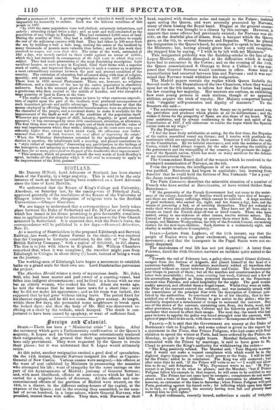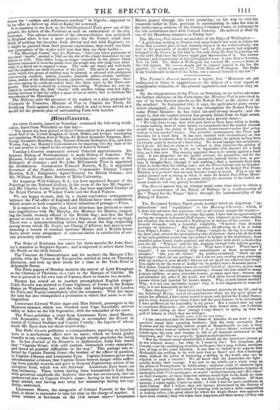5ortign anb
SPAM—There has been a "Ministerial crisis" in Spain. After Abe ceremony which gave a Parliamentary confirmation to the Queen's majority, S. Lopez and his Cabinet somewhat ostentatiously tendered their resignation, on the ground that their appointment had hitherto been only provisional. They were requested by the Queen to retain their places ; but it was understood that S. Lopez would ultimately retire.
At this point, another resignation excited a good deal of speculation. On the 14th instant, General Narvaez resigned his office as Captain- General of New Castile. Various causes were assigned,—his offence at the want of zeal exhibited by Ministers in prosecuting the assassins who attempted his life ; want of sympathy for the same outrage on the part of the Ayuntamierrto of Madrid; jealousy of General Serrano ; and, with most likelihood, offence at some censure which he had in- curred for a singular breach of decorum. All the officers and non- commissioned officers of the garrison of Madrid were treated, on the 12th, to a dinner, in the different eating-houses of the capital, at the expense of the Queen ; and in the evening they assembled, to the num- ber of seven hundred, in a large saloon, where General Narvaez, who presided, treated them with coffee. They then, with Narvaez at their
head, repaired with drunken noise and tumult to the Palace; insisted upon seeing the Queen, and were severally presented by Narvaez, many of them kissing the Royal hand. Disgust at the general coarse- ness of the man was brought to a climax by this. outrage. However, it appears that some offence had previously existed ; for Narvaez was ab-
sent, on the doubtful plea of illness, from a banquet which the Queen gave, on the 9th, to several Senators and Deputies. When he placed his resignation in the Queen's hand, he attempted to speak to her against the Ministers ; but, having already given bun a very cold reception, she stopped him by saying, " I wish to be left with any Ministers.'
This resignation probably was the finishing-stroke to the fate of the Lopez Ministry, already dismayed at the difficulties which it would
have had to encounter in the Cortes ; and on the evening of the 15th, the Queen commissioned S. Olozaga to form a Cabinet: it was sup- posed that General Serrano would continue in office. Some kind of reconciliation had occurred between him and Narvaez ; and it was sur- mised that Narvaez would withdraw his resignation.
The Madrid papers contain the replies which Queen Isabella the Second made to the Deputations of the two Chambers, when they waited upon her on the 9th instant, to inform her that the Cortes had passed the law enacting her majority. Her answers are curious, as exhibiting how soon young persons in such stations' though of no apparent abilities, acquire the trick of royalty. Her Majesty comported herself with " singular self-possession and dignity of manners." To the Senators she said- " The sentiments expressed to me by the Senate are in perfect accord with the patriotism and prudence which preside at all its deliberations ; and the wishes it forms for the prosperity of Spain are also those of my heart. With your assistance, and by always conforming to the letter and spirit of the Constitution of 1837. 1 will endeavour to realize the hopes which the Spanish nation rests on my reign."
To the Deputies-
" I feel the most lively satisfaction at seeing, for the first time, the Deputies of the nation assembled round my throne; and I receive with gratitude the sentiments which are expressed in their name. Tomorrow I will take the oath to the Constitution. By its faithful observance, and with the assistance of the Cortes, which I shall always respect, for the sake of insuring the stability of the government and the tranquillity of the country, I will promote the happi- ness of the Spanish nation, which has made so many sacrifices for the defence of my constitutional throne."
The Commandant Baseti died of the wounds which he received in the attempted assassination of Narvaez, on the 6th.
From the provinces, the intelligence is of no new character. Galicia was pacified. Barcelona had begun to capitulate; but, learning front A metier that he could hold the fortress of San Fernando "for a year," the Junta renewed hostilities.
The Paris Commerce describes the miserable situation of a number of French who have settled at Barcelonetta, or have retired thither from Barcelona- " If the generosity of the French Government had not come to the assist- ance of the colony, hundreds of families would actually have died of hunger; and there are still many sufferings which cannot be relieved. A large number of good workmen, who earned six, eight, and ten francs a day, have not the means of procuring a bed, or of covering themselves. They are reduced to make their wives and children sleep on mats. They have not all been able to remain on board the French ships-of-war or hired vessels. Those who have landed, owing to sea-sickness or other causes, receive rations ashore. The Consul of France is endeavouring to procure them straw beds. Madame de Lessem;' and Madame Weshynthius, the wife of the Swedish Consul, are making clothes for the new-born children. Such distress is a melancholy sight, and charity is unable to relieve it completely."
ITALY.—Letters from Leghorn, of the 11th instant, say that the people of Naples were in great excitement, expecting some sudden movement ; and that the insurgents in the Papal States were not en- tirely dispersed.
The melodrama of real life has not yet departed I A letter from Palermo, dated the 28th October, narrates an incident quite suited to the stage- " Towards the end of February last, a galley-slave, named Gianrii Coltroni, escaped from the fortress of Augusta, and placed himself at the head of a numerous banditti. Those malefactors mercilessly robbed all travellers who journeyed without an escort between Palermo and Carini. The Government sent troops in pursuit of them ; but all the marches and countermarches of the latter were unavailable ; when, some evening lest week, Coltroni and a few of his accomplices, disguised as friars, presented themselves at the Franciscan convent near Palermo, and asked hospitality for the night. The good monks readily assented, and afforded them a frugal repast. Whilst they were at table, the Prior of the convent entered the refectory, and was instantly struck with the resemblance of the principal friar with the description of Coltroni pub- Hailed by the authorities. So convinced was he of his identity, that he des- patched one of the monks to Palermo to give notice to the police; who im- mediately despatched a detachment of troops to surround the convent. But one of the stores of the convent, containing corn, flour, dry fruits, wood., and other provisions, having taken fire, Coltroni and his followers profited by the confusion that ensued to effect their escape. The next day, the monk who had gone to town to apprize the police was found strangled near the convent, with apiece of paper fixed to his neck, with these words= Recompense of the traitor: " FRANCE.—It is said that the Government are uneasy at the Duke of Bordeaux's visit to England ; and some colour is given to the report by a statement in the Times, that Prince Polignac, who had come with four children to spend the winter at Paris, had been ordered by the Police, on Monday, to quit it in forty-eight hours. Marshal Sebastiani, who is connected with the Prince by marriage, is said to have gone to St. Cloud to procure the King's authority for withdrawing the order- " The King positively refused. The Marshal said, Your Majesty is aware that I would not make a request compliance with which would be in the slightest degree dangerous for your royal person or the State. I will be bail for the Prince,' added he in conclusion. The Sing was still unmoved; but
after some time he said, If the Prince will write to me I would not allow hint to do so,' said Sebastiani Why, Peyronnet wrote to me.' 'M. Pey-
ronnet is at liberty to do what he pleases,' said the Marshal; but if Prince Polignac follow his example in that respect, he will cease to be entitled to my esteem. The Prince has not come here to conspire ; conspirators do not move about with a train of four children.' The only concession he obtained was, however, an extension of the time to Saturday; when Prince Polignac will quit Paris, protesting against his forced exile; for inflicting which upon him there is, in fact, no legal ground, the amnesty having been full and plenary that restored him to civil rights."
A Royal ordinance, recently issued, authorizes a credit of 990,000
francs for "sudden and unforeseen services" in Algeria ; supposed to be an offer to deliver up Abd-el-Kader for a reward.
It is amusing to see how, as the fortifications of Paris grow out of the ground, the horror of the Parisians at such an enthralment of the city increases. The odious character of the circumvallation was perceived in England when it was a mere project ; but the French could then think of nothing but invasion from abroad and war with England ; or, it might be guessed from their present expressions, they could not form ally conception of the works until now that they see them bodily- " The Municipal Guard," says La Reforme, "have just taken possession of
the small ' erected in 1843 on the site of the citadel demolished by our fathers in 1789. This edifice being no longer concealed by the planks which hitherto concealed it from the public view, the people may now judge how admi- rably it is fitted out to support a siege. The walls are massy and well-built, and the loopholes are chefs d'ieuvres of the kind. The arch of the gateway, under which two pieces of artillery may he planted, is adorned with sculptures representing muskets, pistols, cannons, poniards, sabres, swords, cartridge- boxes, shakos of the Municipal Guards, epaulets, uniforms, and drums ; there are even among the emblems cocked hats, like those worn by the Town-ser- geants. This arch is closed by a strong iron railing. Workmen are now oc- cupied in encircling the little • bastile' with another railing nine feet high ; leaving between it and the edifice a space of ten or twelve feet to facilitate the movements of the Municipals."
The Reforme calls the attention of its readers to a plan proposed by Clermont de Tonnerre, Minister of War to Charles the Tenth, for fortifying Paris against the citizens ; which is said to have served as a model for the present plan of surrounding Paris with bastiles.



























 Previous page
Previous page